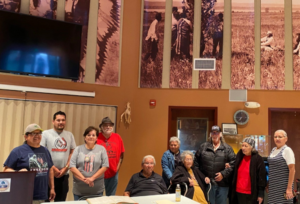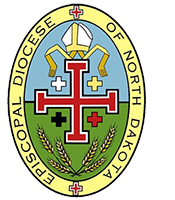The Episcopal Diocese of North Dakota was awarded a 2022 United Thank Offering Grant for a threefold project at St. Paul’s, White Shield: prayer path with medicine plants, traditional garden, and elder-led retreats (stories about the spiritual aspect of creation care). This project will serve to bring the community into right relation with Creator, neighbor, and earth, while serving as environmental reparations for land lost to the Garrison Dam “agreement” of 1948, forcing the tribe from its home on the Missouri River. The dam was intended to provide flood control, hydroelectric power, and a recreational body of water, but subsumed original homelands. This project will enable the congregation to enrich their geo-spiritual home created by forced relocation, making reparation for prior loss; support development of formation materials, with elders sharing stories of traditional planting practices; and enable community outreach by sharing of Arikara spirituality.
At a fall 2021 meeting of the congregation, tribal elders/church leaders embraced this project and it was unanimously decided to pursue this new ministry of St. Paul’s Episcopal Church, especially in light of cultural genocide perpetuated on the Sahnish people, who at one time were almost decimated by small pox. This threefold project will be an “outward and visible sign” of cultural pride and spiritual healing, as a much-needed focus for intentional learning and meditation on right relationship with Creator, earth, and one another.
In addition to serving as a spiritual focus for the congregation, this project will serve the entire MHA Nation of the Three Affiliated Tribes (Mandan, Hidatsa, Arikara). It will also be a significant cultural outreach to visitors to the reservation, who are curious about the spiritual significance of traditional Sahnish planting and associated stories. This project will also be a site for diocesan reconciliation pilgrimages and a way to invite reflection on environmental reparations for land once lost and a testament to survival and holding balance and right relation with Mother Earth. The area will be open to the public for private prayer.
St. Paul’s Church remains an important congregation in the Diocese, led by a priest who is also a tribal elder, one of few individuals able to pass on traditional knowledge. This project will physically embody a spiritual vision that will preserve and perpetuate teachings of elders for future generations, providing space for meditation on reconciliation. Sahnish tradition of incorporating medicinal plants and gardens into spiritual practice exemplifies right relationship with Creator, neighbor, earth.
Supported by the expertise of parishioner Robert Fox, Cultural Wellness Specialist at United Tribes Technical College, with knowledge of traditional gardening, combined with wisdom of tribal elders, the goal is to highlight the cultural heritage of creation care and Sahnish survivance as evidenced by balanced relationship with the land, despite original lands being flooded.
UTO funding will assist in the purchase of a vehicle for clearing/planting, as well as trees for the prayer path, raised beds and an irrigation system for the traditional garden. Funding will also assist in creation of signage in both Arikara and English to help guide and teach visitors along the prayer path and through the traditional garden. In addition, funding will support curricula development led by elders, who will impart Sahnish traditions within the Christian context, as well as help establish a web presence for the congregation.
As explained by Robert Fox in the grant application cover letter, “Our tribe has survived colonization and this project would be an ‘outward and visible sign’ of a vision for healing that will preserve and perpetuate teachings of elders for future generations. … It would be [a] cultural outreach to visitors to the reservation [who are] curious about the spiritual significant of traditional Sahnish planting and associated stories and a site for diocesan pilgrimages, inviting prayerful reflection on reconciliation. … St. Paul’s, guided by elder Rev. Duane Fox, remains an important congregation in the Diocese of North Dakota. Funding would be a boon to our church and community, enabling us to share more fully of our cultural tradition within a Christian context.”

 Care of Creation Grant Award
Care of Creation Grant Award